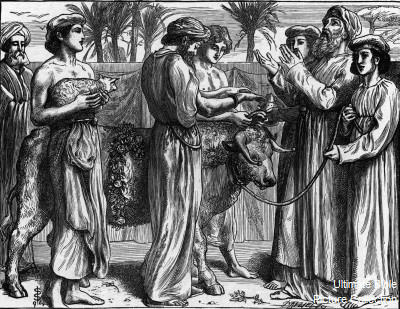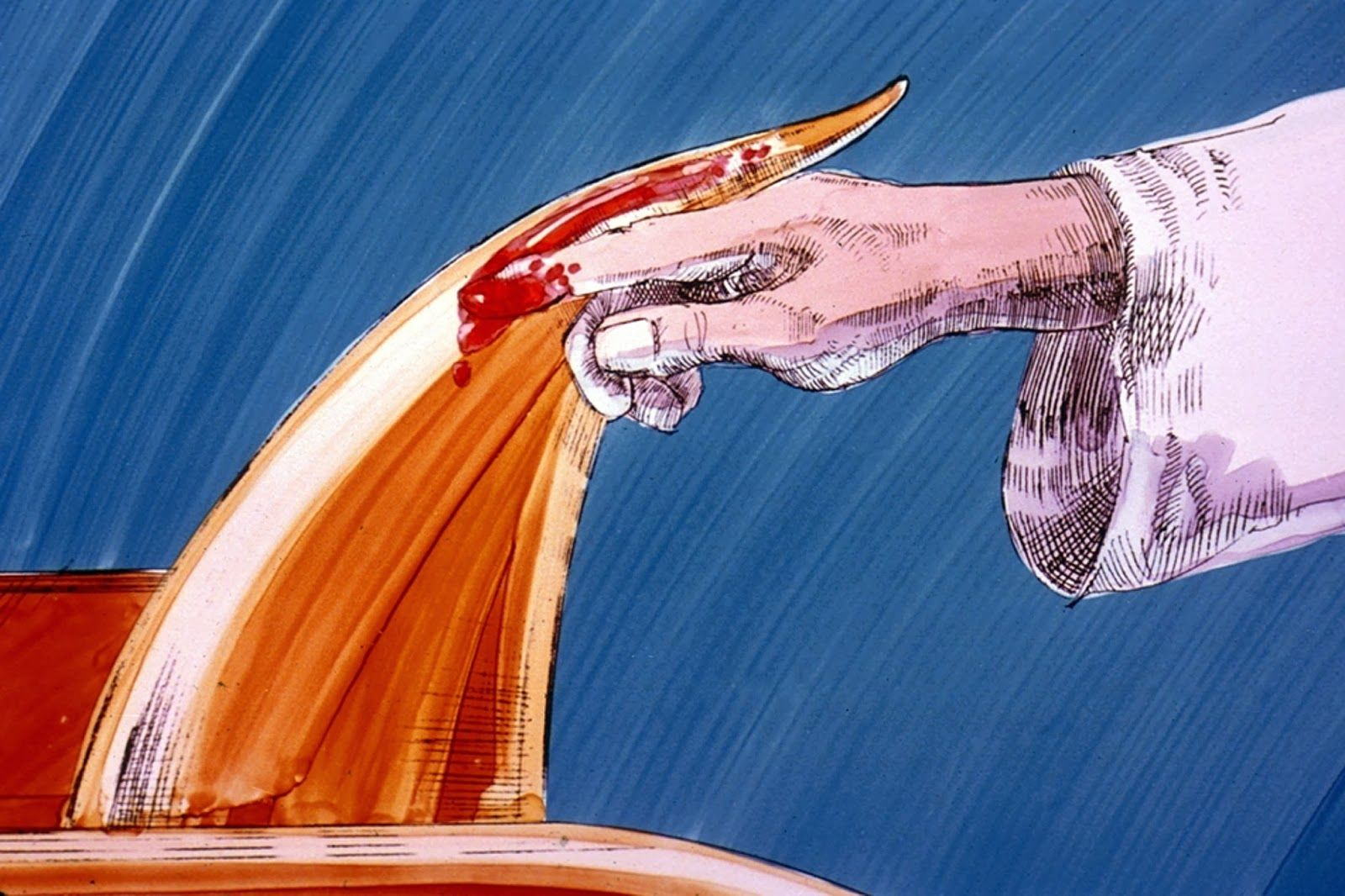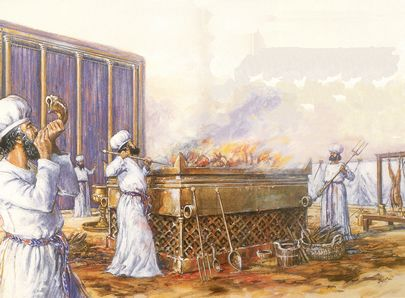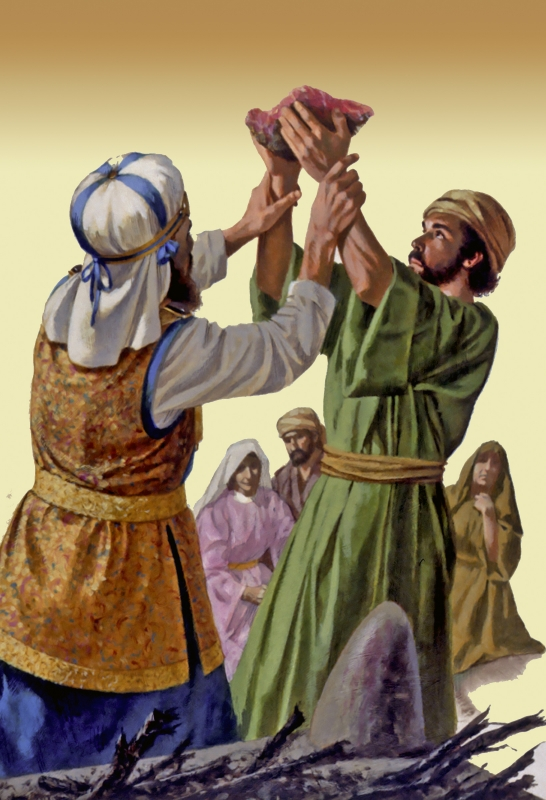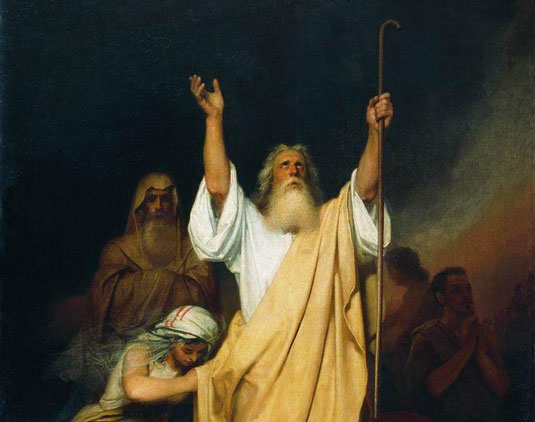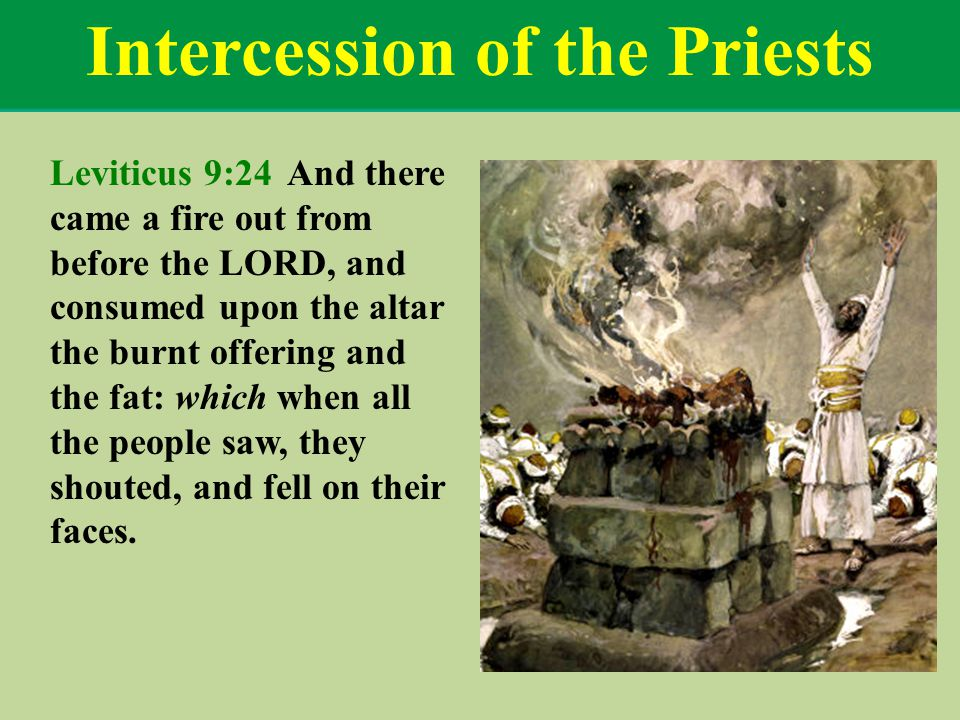Leviticus 9: Lessons For Helping the Nation to Reconcile with God
Introduction. Chapter 8 of Leviticus described a seven-day ceremony for Aaron and his sons to be ordained as priests. The primary purpose of the ceremony was to cleanse and prepare the priest for service. Chapters 6 and 8 tell us of a priest’s role in helping individuals to be reconciled with God through the five sacrifices. Chapter 9 focuses on the priest’s role in helping the country to be reconciled with God. Any believer in Christ is called to be part of His holy priesthood (1 Pet. 2:5, 9). We are all called to help restore our country. We need only accept that calling with faith. Yet, many people have trouble accepting that our prayers on behalf of the nation will make a difference. How can we have faith when we have sinned in our past? This is where this chapter begins.
From this chapter, God gives believers fourteen important lessons. (1) As symbolized by the ordination on the eighth day, you are to have faith that you are a new creation in Christ. (2) From God’s promise that Aaron and his sons would see Him, you are to have faith in His promises. (3) He instructs that you walk with Him by obeying His Commandments. (4) As a priest for God, you are to pray for the nation’s sins. Yet, before praying for the nation’s sins, you must pray for Him to forgive your sins. (5) You must pray without doubt. (6) Your prayers should be of a righteous nature. (7) You should renew your mind daily to make sure that your thoughts and motives are pure. (8) In order for your prayers to be meaningful, you need to be burdened out of love for the plight of others around you. This includes the unsaved, the poor, the sick, and those caught in sin. (9) Your life should be a living sacrifice for God and for others. (10) You should live a morally pure life as an example to others. (11) Help others to find a love for God through your own example. (12) Live a humble life as an example to others. (13) You should also bless others by both your words and your actions. (14) You should always seek God’s guidance through the Spirit.
1. Have faith as a new creation in Christ.
The symbolism of the eighth day. After the seven-day ordination (Lev. 8:35-36), the priest’s duties began on the eighth day. “Now it came about on the eighth day that Moses called Aaron and his sons and the elders of Israel;” (Lev. 9:1). Seven is a number of completeness in the Bible. God created the world in six days and rested on the seventh (Ex. 20:11). The number eight in the Bible symbolizes a new beginning. A male child is circumcised on the eighth day (Lev. 12:3). After the seven-day festival of Tabernacles, the people were together for a holy convocation to celebrate a new beginning on the eighth day (Lev. 23:36). Christ also rose from the dead on a Sunday, the first day of the week or the eighth day (Matt. 28:1). We also have a new beginning in Christ. Because of His death and the Spirit within us (Ez. 36:26; 2 Tim 1:14; Rom. 8:9). We have also become a new creation: “Therefore if anyone is in Christ, he is a new creature; the old things passed away; behold, new things have come.” (2 Cor. 5:17; Gal. 6:15; Eph. 4:24). As a new creation, God will forget our old sins: “For I will be merciful to their iniquities, and I will remember their sins no more.” (Heb. 8:12; same 10:17; Is. 43:25; Jer. 31:34; 50:20; Micah 7:18). If you lack the faith to pray for the restoration of your nation, the first step is having faith that you are a new creation in God’s eyes, and your old sins have been forgiven. Have you let doubts about your old sins keep you from praying for the nation? If someone has sinned against you, have you given that person a second chance? (Matt. 6:15).
2. Have faith in God’s promises.
The promise that Aaron and his sons would see God. As their first act, Moses commanded Aaron and his sons to gather the things required to make the sacrifices needed to restore the nation. “and he said to Aaron, ‘Take for yourself a calf, a bull, for a sin offering and a ram for a burnt offering, both without defect, and offer them before the LORD. Then to the sons of Israel you shall speak, saying, ‘Take a male goat for a sin offering, and a calf and a lamb, both one year old, without defect, for a burnt offering, and an ox and a ram for peace offerings, to sacrifice before the LORD, and a grain offering mixed with oil; for today the LORD will appear to you.”’’ (Lev. 9:2-4). If they did this, Moses promised: “For today, the Lord will appear to you.” (Lev. 9:4). To see God, they collected in faith seven animals (a number of completeness): (1) a bull without defect for a sin offering; (2) a ram without defect for a burnt offering; (3) a goat for a sin offering; (4) a one-year old calf for a burnt offering; (5) a one-year old lamb for a burnt offering; (6) an ox for a peace offering; and (7) a ram for a peace offering. In addition, they also prepared a grain offering mixed with oil (Lev. 9:2-3). Collecting the animals required faith in Moses’ God-given directions: “And without faith it is impossible to please Him, for he who comes to God must believe that He is and that He is a rewarder of those who seek Him.” (Heb. 11:6). If you are to fulfill God’s calling as a priest for the nation, you also must have faith in His promises. “So then, does He who provides you with the Spirit and works miracles among you, do it by the works of the Law, or by hearing with faith?” (Gal. 3:5). How are we to “hear with faith” or even know what His promises are for us? We must read His Word: “So faith comes from hearing, and hearing by the word of Christ.” (Rom. 10:17). Besides the promise of eternal life, how many of God’s promises can you name? Are you feasting on the Word to build up your faith and learn His promises? Or, are you on a faith diet?
Aaron’s first offering as high priest1
3. Be obedient to God’s commands.
The commend to be obedient. After hearing God’s Word privately, the priests gathered in faith all that they were told to gather and brought them to “the front of the tent of meeting” in front of “the whole congregation.” “So they took what Moses had commanded to the front of the tent of meeting, and the whole congregation came near and stood before the LORD.” (Lev. 9:5). There, Moses commanded to both the priests and the congregation: “Moses said, ‘This is the thing which the LORD has commanded you to do, that the glory of the LORD may appear to you.’” (Lev. 9:6). We do not earn our salvation by our works. But many blessings or curses on Earth turn upon our actions and our faith. An “unbelieving heart” will cause a person to fall away from God (Heb. 3:12). God warned Moses to obey His angel. He also promised to bless the Jews if they were obedient: “Be on your guard before him [God’s angel] and obey his voice; do not be rebellious toward him and obey his voice . . But if you obey his voice and do all that I say, then I will be an enemy to your enemies and an adversary to your adversaries.” (Ex. 23:21-22). “If you walk in My statutes and keep My commandments so as to carry them out, then I shall give you rains in their season, so that the land will yield its produce and the trees of the field will bear their fruit.” (Lev. 26:3-4, 7-8; Nu 10:9, 35; Dt. 28; Isa. 54:17). The Jews were later barred from entering the Promised Land because of their unbelief and disobedience (Heb. 3:19; 4:6, 11). God also warned that He would vomit the Jews out of the Promised Land if they did not keep His statutes (Lev. 20:22). Jesus also commanded that believers obey His Word. He “fulfilled” the Law as a test for salvation (Matt. 5:17). Yet, He also said that, if we love Him, we will keep His commandments: “If you love Me, you will keep My commandments.” (Jo. 14:15, 21; 15:10; 1 Jo. 5:3; 2 Jo. 1:6). He was the great “I AM” who gave Moses the Ten Commandments (Jo. 8:58; Ex. 3:14). Thus, His commandments were the Ten Commandments. He further led by example in keeping them out of devotion. Or, He corrected the Jews where they had made them ritualistic. He was obedient even unto death: “Although He was a Son, He learned obedience from the things which He suffered.” (Heb. 5:8). “Being found in appearance as a man, He humbled Himself by becoming obedient to the point of death, even death on a cross.” (Phil. 2:8). His “disciples” were the “disciplined ones” in keeping His commandments. As priests for God, we must be obedient to Christ’s Ten Commandments out of devotion. We must also preach for the rest of the nation to be obedient. Have you urged others to obey God’s commandments out of love? Or, are you too embarrassed to do so? (Rom. 1:16).
4. Seek forgiveness so that your prayers for others are not “hindered”.
The command for a new sin offering. Moses instructed Aaron as his first public act to make an atonement sacrifice for the people. “Moses then said to Aaron, ‘Come near to the altar and offer your sin offering and your burnt offering, that you may make atonement for yourself and for the people; then make the offering for the people, that you may make atonement for them, just as the LORD has commanded.”’ (Lev. 9:7). Yet, before he made a sacrifice for the people, he needed to make a sin offering for himself. “So Aaron came near to the altar and slaughtered the calf of the sin offering which was for himself.” (Lev. 9:8). At first, this might seem odd. Aaron and his sons had sacrificed animals for their sins for seven straight days. One would think that the priests could get to work on their first day without making additional sin sacrifices. The Bible does not record any sinful acts of Aaron and his sons between the last day of the consecration and their first day of their work. Yet, the truth is that there are always hidden sins in our hearts that must be cleansed. “You have placed our iniquities before You, our secret sins in the light of Your presence.” (Ps. 90:8). In the Old Testament, God warned that as a consequence of the separation caused by sin, He would not hear the prayers of sinners: “So when you spread out your hands in prayer, I will hide My eyes from you; yes, even though you multiply prayers, I will not listen. Your hands are covered with blood.” (Is. 1:15). “And your sins have hidden His face from you so that He does not hear. For your hands are defiled with blood and your fingers with iniquity; your lips have spoken falsehood, your tongue mutters wickedness.” (Is. 59:2-3). “We know that God doesn’t listen to sinners, but He does listen to anyone who worships Him and does His will.” (Jo. 9:31; Prov. 15:29; 8:9; Ps. 66:18). In the New Testament, God warns that sin can “hinder” a believer’s prayers. (1 Pet. 3:7). If we say that we have no sins, the truth does not reside within us (1 Jo. 1:8). Thus, if we claim that we have gone days without sinning, we place ourselves above Aaron and his sons. The lesson for us is that we must make a daily confession of sins to God. This was the first part of the Lord’s prayer (Matt. 6:9-13). Are you making a daily confession of your sins? If not, your prayers may be “hindered” by your unconfessed sins.
5. Pray without doubt.
The bull’s blood on the horns of the altar. After atoning for his sins, Aaron got down to work on his mission to atone for the sins of the people. His first act was to first place blood on his finger then on the horns of the altar. The rest he poured at the base of the altar. “Aaron’s sons presented the blood to him; and he dipped his finger in the blood and put some on the horns of the altar, and poured out the rest of the blood at the base of the altar.” (Lev. 9:9). This repeated a procedure that Aaron and his sons followed during the ordination process (Lev. 8:14-15). This was a second confession of faith in the power of Christ’s blood. The horns symbolize power (Ps. 18:2; 89:17; Lk. 1:69; Lam. 2:3; 1 Kgs. 1:50; 2:28). By placing the blood on the horns, Aaron professed that the power of the blood to forgive sins was great (Heb. 9:22). The power of Christ’s blood is strong enough to wipe away all condemnation of sins (Rom. 8:1). Yet, if you pray with doubt, God may not hear your prayers. “But he must ask in faith without any doubting, for the one who doubts is like the surf of the sea, driven and tossed by the wind. For that man ought not to expect that he will receive anything from the Lord, being a double-minded man, unstable in all his ways.” (Jam. 1:6-8). There are many examples in the Bible where God relented after intercessory prayer. For example, Moses’ prayers saved the Jews after they made the golden calf (Ex. 32:11-14). His prayers saved them when they murmured against God (Nu. 11:2). His prayers also saved the nation when the Jews rebelled at the edge of the Promised Land (Nu. 14:18-22). His prayers also saved the nation after they rebelled regarding Korah’s death (Nu. 16:21-24). Is there any doubt in your heart that God acts on your prayers for others? If so, you are not ready to fulfill your calling for Him.
blood on the horns of the altar2
6. Pray righteous prayers.
The smoke offering. To create a “smoke offering,” Aaron then took the fat around the inner parts, the liver, and the kidneys of the sin offering (the one year old calf and lamb) and burned them on the altar. “The fat and the kidneys and the lobe of the liver of the sin offering, he then offered up in smoke on the altar just as the LORD had commanded Moses.” (Lev. 9:10). The hide and the flesh, however, were burned away from God outside the camp. “The flesh and the skin, however, he burned with fire outside the camp.” (Lev. 9:11). This again repeated the smoke offering from the ordination process (Lev. 8:16-17). Jesus became our condemned flesh. Thus, He was sacrificed outside of Jerusalem on Calvary Hill to fulfill this law (Heb. 13:11-13). The clean smoke from the burnt offering was a “soothing aroma” to God (Lev. 1:9; Ex. 29:18). Christ’s blood was also a soothing aroma (Eph. 5:2). Today, we can create a “soothing aroma” for God through our prayers (Ps. 141:2; Rev. 5:8; 8:4). By only using the fat around the organs that keep the body clean to create this smoke, this meant that the priest was to offer up prayers that were holy (Lev. 9:10; 8:16). The calf symbolized the submission of strength to be humble (Matt. 23:12). The lamb symbolized submission to God’s will (Jo. 1:29). These are both qualities that God expects us to show in our walk as serve as His priests. By excluding the hide and the flesh from the smoke offering, the prayers were not to dwell on unclean things (Lev. 9:11; 8:17). By repeating this ceremony immediately after the ordination process, the priest committed to making righteous prayers every day. We must also commit to making prayers for others become part of our daily prayer life. If you are praying for the sins of the nation and others, your prayers are righteous and pure. If you are only praying for God to provide for you, your prayers may appear to God like the animal hide that had to be burdened outside the camp.
Imagine credit3
7. Be pure in your thoughts and motives.
The cut and washed burnt offering. Aaron’s sons then slaughtered the burnt offering (a bull and a ram) and handed them in pieces, including the heads, to Aaron. “Then he slaughtered the burnt offering; and Aaron's sons handed the blood to him and he sprinkled it around on the altar. They handed the burnt offering to him in pieces, with the head, and he offered them up in smoke on the altar.” (Lev. 9:12-13). Aaron burned the pieces as a smoke offering. Yet, he washed the innards and the legs before burning them. “He also washed the entrails and the legs, and offered them up in smoke with the burnt offering on the altar.” (Lev. 9:14). This also repeated part of the ordination ceremony (Lev. 8:20). The cutting of the animal symbolized that no secrets were kept from God (Ecc. 12:14). The specific reference to the head meant that God knows our thoughts, and the priest was offering to keep his thoughts pure. The washing of the innards meant that we are to keep our innermost thoughts and motives pure. The washing of the legs means that we are to purify ourselves from everything that we are exposed to in our walk in the world. Like the calf, the sacrifice of the bull symbolizes that the priest gave his strength to God by humbling himself (Phil. 4:13). The ram was a symbol of substitution (Gen. 22:13). The priest substituted the will of God for his own. By burning the sacrifices entirely, the priest symbolized that nothing of his old self would be left as he served God. By repeating this process after the ordination, the priest vowed to ensure every day that he was humble and his thoughts were pure. We also are commanded to renew our minds daily (Rom. 12:2). Unless our thoughts and motives are pure, God cannot accept them (Amos 5:21-24). Is your behavior motivated by only your own needs? If your thoughts and motives are focused only on yourself, you are not yet ready to fulfill your calling as a priest.
8. Be Burdened by the Sins of Others.
The goat offering for the people. After Aaron and his sons finished preparing themselves, Aaron presented “the people’s offering.” He slaughtered the goat as a sin offering. “Then he presented the people's offering, and took the goat of the sin offering which was for the people, and slaughtered it and offered it for sin, like the first.” (Lev. 9:15). He then presented a burnt offering according to “the ordinance,” which were the procedures that God specified in Leviticus chapter 1. “He also presented the burnt offering, and offered it according to the ordinance.” (Lev. 9:16). The goat was the sin offering for the common persons (Lev. 4:27-35). As symbolized by the ephod with the 12 stones for all the 12 tribes worn over his heart, the priest was to be at all times burdened by the suffering and sins of the common persons around him (Lev. 8:8; Ex. 28:15-21). Here, the first act of the priest after preparing himself for service was to atone for the sins of the people. We are a nation of priests (1 Pet. 2:5, 9; Rev. 1:6). Unlike the High Priest who could only enter the Holy of Holies once per year, we can now do so with “boldness” every day (Heb. 10:19-22 (KJV)). Jonah was told to give God’s warning to a sinful people that he did not like. Are you willing to offer prayers for the people you don’t like? Are you helping people you don’t like learn the path to salvation? Are you praying for your enemies? (Matt. 5:44).
9. Offer your life to helping people restore their lives.
The grain offering. The next sacrifice for the priest on behalf of the people was the grain offering mixed with oil. “Next he presented the grain offering, and filled his hand with some of it and offered it up in smoke on the altar, besides the burnt offering of the morning.” (Lev. 9:17, 4). The grain offering symbolizes giving the best of one’s life to thank the Lord for the forgiveness of sins (Lev. 2). Oil symbolizes the Holy Spirit (1 Sam. 16:13). Instead of grain, Paul tells us to offer our lives as a living sacrifice: “Therefore I urge you, brethren, by the mercies of God, to present your bodies a living and holy sacrifice, acceptable to God, which is your spiritual service of worship.” (Ro. 12:1). Yet, we are to do so when led by the Spirit. Here, the context means that the priest committed to letting the Spirit lead him in helping others restore God in their lives. This of course requires that the we play an active role in sharing our faith. Christ commands us to “make disciples,” to “baptize them”, and to “teach them to observe all that I have commanded you . . .” (Matt. 28:19-20). Have you doing any of these things?
10. Help others to deny pleasures for God and live morally pure lives.
The fat, liver, and kidneys of the peace offering for the people. After the priest made a sin and a grain offering for the people, his next offering was a peace / Shalom offering. “Then he slaughtered the ox and the ram, the sacrifice of peace offerings which was for the people; and Aaron's sons handed the blood to him and he sprinkled it around on the altar.” (Lev. 9:18). For the people, the priest offered from the ox and the ram the fat that surrounded the tails (a delicacy), the kidneys and the livers (symbols of purity), and the breasts (a symbol of love). “As for the portions of fat from the ox and from the ram, the fat tail, and the fat covering, and the kidneys and the lobe of the liver, they now placed the portions of fat on the breasts; and he offered them up in smoke on the altar.” (Lev. 9:19-20). All of this was offered as a smoke offering (Lev. 9:20). As stated above, smoke can also be a symbol of prayer (Ps. 141:2; Rev. 5:8; 8:3). The priest’s ultimate goal was to help others establish fellowship with God. That is the meaning behind the peace offering. Here, the priest was committing to doing these sacrifices both in his own life and in helping to convince others to do the same. Lead by your example as you deny yourself and live a pure life out of love and devotion to God. Yet, don’t do these things in secret. You must be a light to others (Matt. 5:13-14). You must pray for others to follow this path. You must also actively encourage others to live a God-based morally pure life. Are you doing any of these things?
11. Help others to find a love for God.
The wave offering of the animal’s breast. The priest also made a wave offering of the animal’s breasts: “But the breasts and the right thigh Aaron presented as a wave offering before the LORD, just as Moses had commanded.” (Lev. 9:21). The breast is a symbol of love, i.e. love for a baby. God so loved the world so much that He gave up His only begotten son (Jo. 3:16). Christ so loved us that He gave up His life for us (Phil. 2:8). Your decision to voluntarily live by God’s law is a sign of your love for Christ (Jo. 14:15, 21, 23; 15:10; 1 Jo. 2:3; 5:3). Is God’s love in your life visible for others to see and follow?
12. Help others to lead a humble life.
The wave offering of the right thigh. As quoted above, the priest also made a wave offering of the right “thigh” (NASB/NIV)/ “shoulder”(KJV) (Lev. 9:21). The thigh and shoulder muscles are symbols of strength. Out of love, the priest offered a humbled life. He gave up his strength to let God be his strength. Many of God’s tests in life are designed to humble you when pride or others’ sins spread within you: “You shall remember all the way which the Lord your God has led you in the wilderness these forty years, that He might humble you, testing you, to know what was in your heart, whether you would keep His commandments or not.” (Dt. 8:2). Is humility in your life visible for others to see and follow?
Wave offering (Image credit)4
13. Be a blessing to others.
Aaron’s blessing. Aaron concluded by giving a prayer of blessing to the people. “Then Aaron lifted up his hands toward the people and blessed them, and he stepped down after making the sin offering and the burnt offering and the peace offerings. Moses and Aaron went into the tent of meeting. When they came out and blessed the people, the glory of the LORD appeared to all the people.” (Lev. 9:22-23; same Nu. 6:23-26). Most of the great leaders of the Bible gave blessings to their people. For example, with Noah’s final recorded words, he blessed and gave prophetic words for his children (Gen. 9:24-27). At a time when Isaac incorrectly thought that he was about to die, he sought to bless his eldest son Esau. Yet, he was tricked into giving that blessing to Jacob (Gen. 27:34-41). At the end of his life, Jacob blessed and gave prophetic words to each of his 12 sons (Gen. 49). In Moses’ final words, he blessed the 12 tribes of Israel (Dt. 33). Jesus also promised a blessing with His final words: “I am with you always, even to the end of the age.” (Matt. 28:20). Paul later offered a similar prayer of blessings to others (2 Cor. 13:14). Today, a blessing at the end of a church service is called a prayer of “benediction.” We should also be looking for ways to bless others. We should also pray for God to bless others. Our goal should never be to condemn a sinner. That is what Satan does as the accuser of the brethren (Rev. 12:10). Instead, our goal should be to restore the person who has sinned: “Brethren, even if anyone is caught in any trespass, you who are spiritual, restores such a one in a spirit of gentleness; each one looking to yourself, so that you too will not be tempted.” (Gal. 6:1). When was the last time that you prayed for God to bless someone who was not a family member or friend? When people around you sin, do you gossip about them or do you seek to restore them? If you want to be a blessing to others, help the needy and those who are trapped in their sins.
Aaron’s blessing (Image credit)5
14. Seek God’s revelation through the Spirit.
The Glory of God Appeared. After Aaron and his sons consecrated themselves and vowed to help God’s people, God showed His approval by causing His glory to appear. “Moses and Aaron went into the tent of meeting. When they came out and blessed the people, the glory of the LORD appeared to all the people. Then fire came out from before the LORD and consumed the burnt offering and the portions of fat on the altar; and when all the people saw it, they shouted and fell on their faces.” (Lev. 9:23-24). The glory of God only appeared: (1) when God gave Moses his commission at the burning bush in Midian (Ex. 3:1-6); (2) when Jesus gave the Ten Commandments on Mount Horab (Ex. 24:9-17; Jo. 8:58; Ex. 3:14); (3) when the Jews completed the Tabernacle in the wilderness (Ex. 40:34-35); and (4) when the Jews completed the Temple in Jerusalem (1 Kgs. 8:10-11; 2 Chr. 7:1). We will also see His full Shekinah Glory when we get to heaven. In the New Testament, the glory of God revealed through Christ: “And the Word became flesh . . . and we saw His glory, glory as the only begotten from the Father, full of grace and truth.” (Jo. 1:14). We can still also see God’s glory in the stars. They tell of “the glory of God.” (Ps. 19:1). Nature also reveals His glory (Rom. 1:20). Jesus will also share His glory with those who diligently obey the Word: “[T]hey have kept your Word . . . . The glory which You have given to Me I have given to them, that they may be one, just as We are one.” (Jo. 17:6, 22; Rom. 5:2; Col. 3:4). How can we have this glory revealed to us? If sin can cause the Lord to turn away from our prayers (Is. 1:15-17), diligently obeying God’s Word will allow God’s glory through the Holy Spirit to be revealed to us. The Spirit will reveal God’s glory in our lives when we obey Jesus’ commands to serve the poor, the sick, and the hungry (Matt. 25:31-46). The Spirit will reveal God’s glory when we are obedient to pray for others, when we instruct others to be disciples, when we baptize others, and when we teach God’s law (Matt. 28:18-20). Have you used the spiritual gifts that God has given you to help others and pray for the nation? Or, have you buried the talents that God has given you for yourself? (Matt. 25:14-30). Be obedient to God’s Word, and He will reveal His glory to you by giving to you the gifts and fruits of the Holy Spirit, which includes peace.
Image credit6
